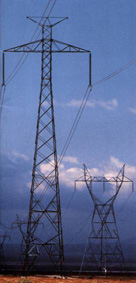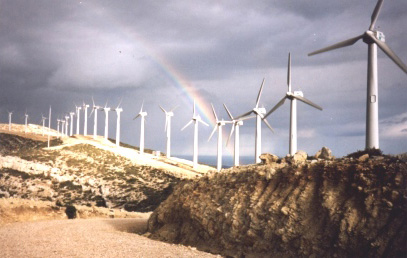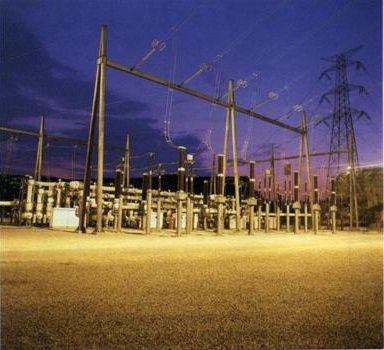- Whatís Electrical Engineering?
- What makes an Industrial Technical Engineer on Electricity Speciality?
- Access to the Electrical Engineering studies.
- Recommended courses of the High School modality.
- If I want to continue studying, which correspondences are with other titles of the UPC?
- Professional job.
- Laboratories.
- European Programs.
- University-Industry Cooperation and job possibilities.


Whatís Electrical Engineering?
The electricity is an easy form to transport, control, and transform other kind of energy. At the present time, electrical power energy canít be replaced like a basic energy system, without which we could not imagine the current world.
The Electrical Engineering is dedicated to the command of the electricity: the generation from out the primary energy sources, the transform, and the transport at great distances through high-tension cables, the distribution in the industrialists and domestic places, and finally the transformation in motion, in heat or light for the industry and for the homes.
The Electrical Industry has a huge economical importance and is the basis almost of all the other technologies. Unlike other branches of the Engineering, the Electrical Engineering has always founded in scientific bases. Even its birth, which we can date of 24 November of 1831, it is a consequence of the extraordinary repercussion that it had the public demonstration that Michael Faraday made of the electromagnetic induction principle at the Royal Society of London.
The Electrical Engineering is a classical technology that has attained a high degree of maturity, but also it is a dynamic technology, which develops at great speed, thanks to the impulse of the new technologies on materials, on electronics and on computer science. This vitality of the electrical technology, added to the need to go towards a sustainable society, that harmonizes the progress with the respect to the environment, it is stimulating the research in the field of the Electrical Engineering.
Forcing that the generation of electrical energy has to become in form clean and efficient, tending to headquarters of gas of combined cycle and renewable energies like the wind power and the solar one. Electrical engines with best performances and the electronic control of the electrical operations improve the productivity and the quality of the industrial products. Making electrical, safer and reliable and at the same time more efficient facilities.
Designing electrical switchgear apart from a better adaptation to its function they can be programmed and control themselves electronically at a distance. Developing better lamps of low consumption allow carrying out better facilities of lighting. In a next future the electrical energy will charge a new impulse in the transport, not only with the growth of the train nets of high speed but also with the beginning of the commercialization of electrical and hybrid cars.


What makes an Industrial Technical Engineer on Electricity Speciality?
The Industrial Technical Engineering, Electricity Speciality is part of the set of the Industrial Technologies. The Industrial Technical Engineer, Electricity Speciality has all the attributions in the area of the Electrical Engineering (Law 1 April 1986, num.12/86; BOE 79 of 2 April of 1986). We can suggest that:
- He/she projects, plans and supervises the manufacture, makes the quality assurance control and the maintenance of the machines, devices and equipment for the generation, transport, distribution and utilization of the electrical energy.
- With regard to energetic studies, the engineer makes proposals of optimization of the exploitation of the electrical system of power and makes estimations of future inversions.
- The engineer occupies executive jobs in the areas of commercial direction, production, research, development, and marketing in the companies of generation, transport and distribution of electricity and in enterprises making machines and other electrical material.
- He/she studies the environmental impact in the generation and in the utilization of the electricity. Also has a job in development and use of natural renewable energies, solar power, wind power, hydroelectricity, micro hydro, biomass, and biofuels.
- He/She carries out activities of research in the different areas of the Electrical Engineering.

Access to the Electrical Engineering studies.
You can access to the Industrial Engineering, Electrical speciality from:
- PAAU (Scientific and Technical Option: Physics and Mathematics)
- PAAU (Sciences ?Option: Biology and Chemistry)
- "Formación Profesional" and "Ciclos formativos de Grado Superior"
- COU (A option).

Recommended courses of the High School modality.
- Tecnologic modality: Electrical theory, Industrial Technology.
- Sciences modality: Mathematics, Physics and Chemistry.
Recomended optional courses:
- Electrical theory.
- Practices in a Company.
- Informatics.
If I want to continue studying, which correspondences are with other titles of the UPC?
Once finished the studies of Industrial Engineer, Electrical Specialty, you can continue studying at the UPC in the Industrial Engineering and Management Engineering degrees (direct access) and Automatic and Electronics Engineering, Electronical Engineering and Materials Engineering Materials doing complementary courses.
The Industrial Technical Engineer speciality in Electricity, forgetting the option of the exercise free from the profession, is an engineer very appreciated and with a practically null unemployment rate, which generally develops its employment to the industry in companies of:
- Generation, transmission and distribution of electricity.
- Electrical equipment of low, medium and high voltage.
- Industry of wire and conductors.
- ?Material for lighting.
- Motor and electrical drives.
- Automatic projects.
- Low, medium and high voltage projects.
- Lighting projects.
- Supervision and control.
As part of multidisciplinary teams in industry sectors such as:
- Food Industry.
- Automotive Industry.
- Chemical Industry.
- renewable Energy.
You can also find more Industrial Technical Engineers, Speciality in Electricity, working in::
- Service Enterprises.
- Public Administration.
- High schools.
With the following tasks:
- Management.
- Design and research.
- Production and manufacture.
- Quality.
- Comercial (Ventas, Compras, Marketing).
- Commercial (Sales, Purchasing, Marketing).
- Maintenance.
Practical sessions are done in small groups (3-4 students):
Electrical Engineering Laboratories:
- Electric Measurement Laboratory L-009
- Electrical Machines Laboratory L-010
- Electrical Engineering projects Laboratory L-008
Shared Laboratories of EPSEVG.
- Electronics Laboratory.
- Automatic and Control Sistems Laboratory.
- Infomatic rooms.
The Socrates-Erasmus program of the European Union helps the student mobility and the cooperation among the European Universities. This program includes economic aids and in the case of EPSEVG it is especially addressed to the Final Project accomplishment. The EPSEVG takes part in the CLUSTER excellence network of technical Universities. Many students have done their Final Project to Universities of Ireland, Italy, Holland and Germany and, at the same time, students coming from Italy, Greece and Holland have done studies or their Final Project to the EPSEVG.
University-Industry Cooperation and job possibilities.
Students will be able to carry out stays in practices in companies and institutions inside of of the programs of Educational Cooperation.
EPSEVG helps the student contact with companies which offers jobs for new engineers.
